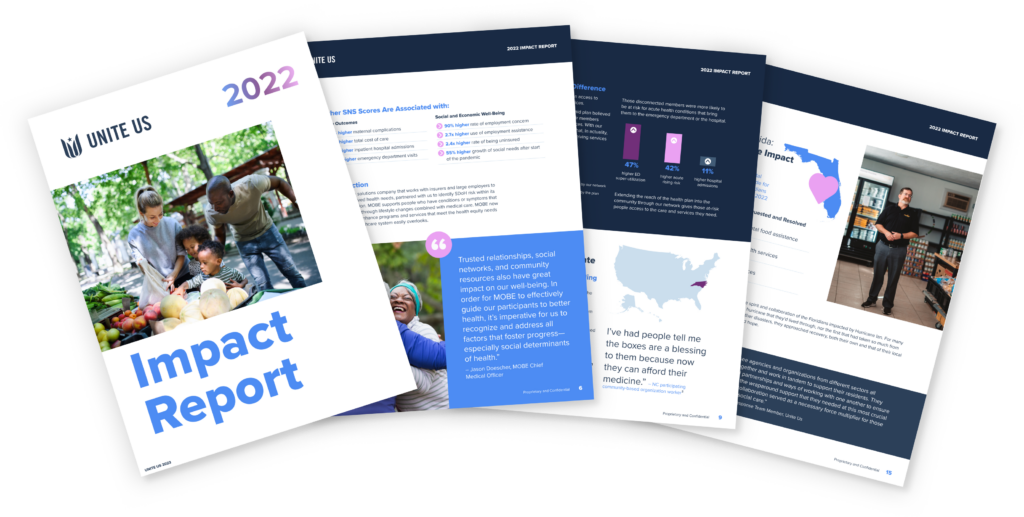
Unite Us Offers Proactive Solutions to Help States Manage the End of Public Health Emergency (PHE)
Ensuring millions of Medicaid members maintain health insurance coverage in the coming months.
While the wide-ranging effects of the COVID-19 pandemic are far from over, spending authorized through the federal government’s COVID Public Health Emergency (PHE) declarations may be ending soon. In the early stages of the pandemic, legislation offered states a significant bump in federal financing in exchange for suspending the usual eligibility redetermination processes. States refrained from terminating publicly sponsored health coverage for individuals who may have experienced changes in eligibility status during the pandemic. Since first established in 2020, PHE declarations have been extended for 90 days at a time; however, they are currently set to expire on April 16, 2022. Once the PHE expires, state Medicaid programs will be faced with the monumental task of reassessing Medicaid eligibility for millions of members within 12 months, creating significant planning and implementation burdens for already overextended state governments.
There are challenges in the Medicaid redetermination process.
The objective of the Medicaid redetermination process is straightforward: to determine who remains eligible, re-enroll those members, and connect ineligible individuals with other potential sources of coverage. However, the execution of redetermination has created significant coverage churn historically. Prior to the pandemic, one in 10 Medicaid beneficiaries lost coverage and were subsequently re-enrolled within a year, likely due to a difficult-to-navigate re-enrollment system, use of old addresses for official redetermination notifications, and actual changes in eligibility, among other factors. These issues have been exacerbated by two years of the COVID-19 pandemic, during which, many vulnerable enrollees may have moved and their eligibility may have changed. These complex challenges will require thoughtful, proactive measures to ensure a successful redetermination process that re-enrolls eligible Medicaid members and directs ineligible individuals to alternative sources of insurance and care.
Targeted outreach efforts will help states assist those most vulnerable.
Medicaid members have diverse needs, communication preferences, and levels of engagement in their own care, which is why a one-size-fits-all outreach and engagement approach won’t work. Fortunately, thoughtful use of available data and robust communications planning can help Medicaid programs customize their outreach strategies in more feasible ways, even for very large memberships. Combining internal claims data with social care referral information and additional, publicly available datasets will help Medicaid programs make more informed decisions regarding potential Medicaid member eligibility and engagement strategies. Social determinants of health (SDoH) provide unique insight as to who is likely to remain eligible but may need additional assistance, as well as those who are no longer eligible for Medicaid but may qualify for subsidized coverage through the individual marketplace or Children’s Health Insurance Program (CHIP). State Medicaid programs can then target additional outreach to their most vulnerable members while connecting individuals with lower health and social risks who are no longer Medicaid eligible to alternative sources of healthcare coverage and support.
Unite Us is uniquely positioned to address challenges effectively.
A successful redetermination process does more than just ensure eligible members renew their Medicaid coverage and others are referred to alternative sources of coverage. It also provides an opportunity to proactively identify and address members’ total health and social care needs, which impact their health as well as educational, employment, and household outcomes. Unite Us is committed to enabling a successful redetermination process across the country, leveraging our end-to-end solution for social care. By partnering with state Medicaid programs and community-based organizations, we can successfully:
- Streamline and improve the Medicaid redetermination process while minimizing gaps in care.
- Help states establish effective risk identification and coordinated-care processes.
- Build an intuitive referral platform designed to better identify at-risk individuals and enroll them in high-impact interventions and services.
- Improve outreach strategies designed to address broader community health and social care needs.
- Continuously monitor and evaluate health and social risks, enabling improvements to the redetermination process during the critical, 12-month, post-PHE period.
Unite Us will help your members get the right care at the right time. To learn more about our end-to-end solution for social care, visit our solutions page.
About Unite Us
Unite Us is the nation’s leading software company bringing sectors together to improve the health and well-being of communities. We drive the collaboration to predict, deliver, and pay for services that impact whole-person health. Through Unite Us’ national network and software, community-based organizations, government agencies, and healthcare organizations are all connected to better collaborate to meet the needs of the individuals in their communities.



